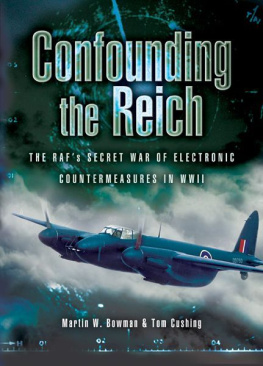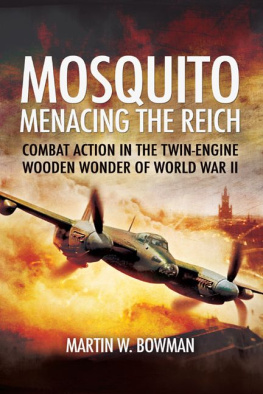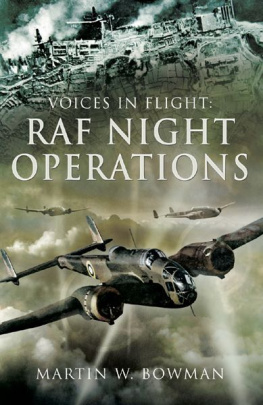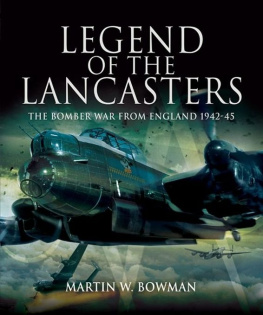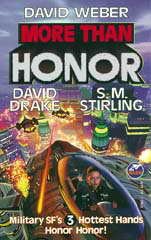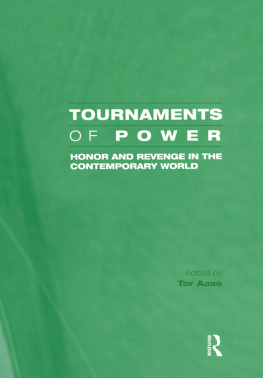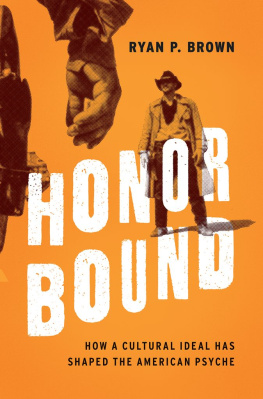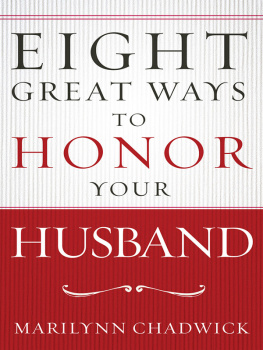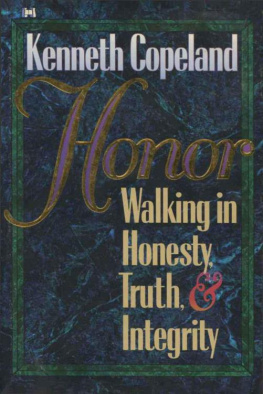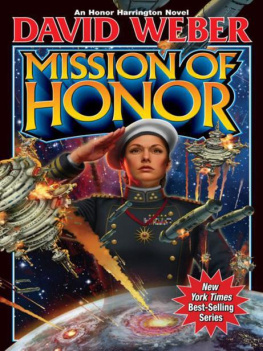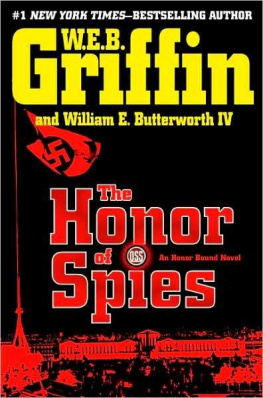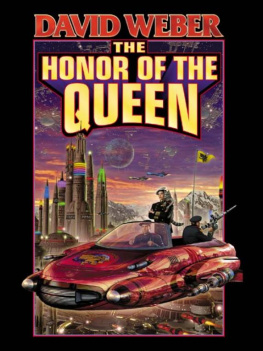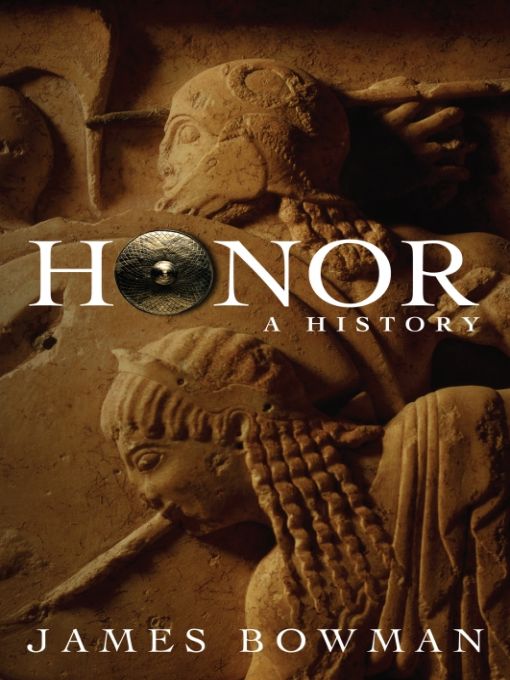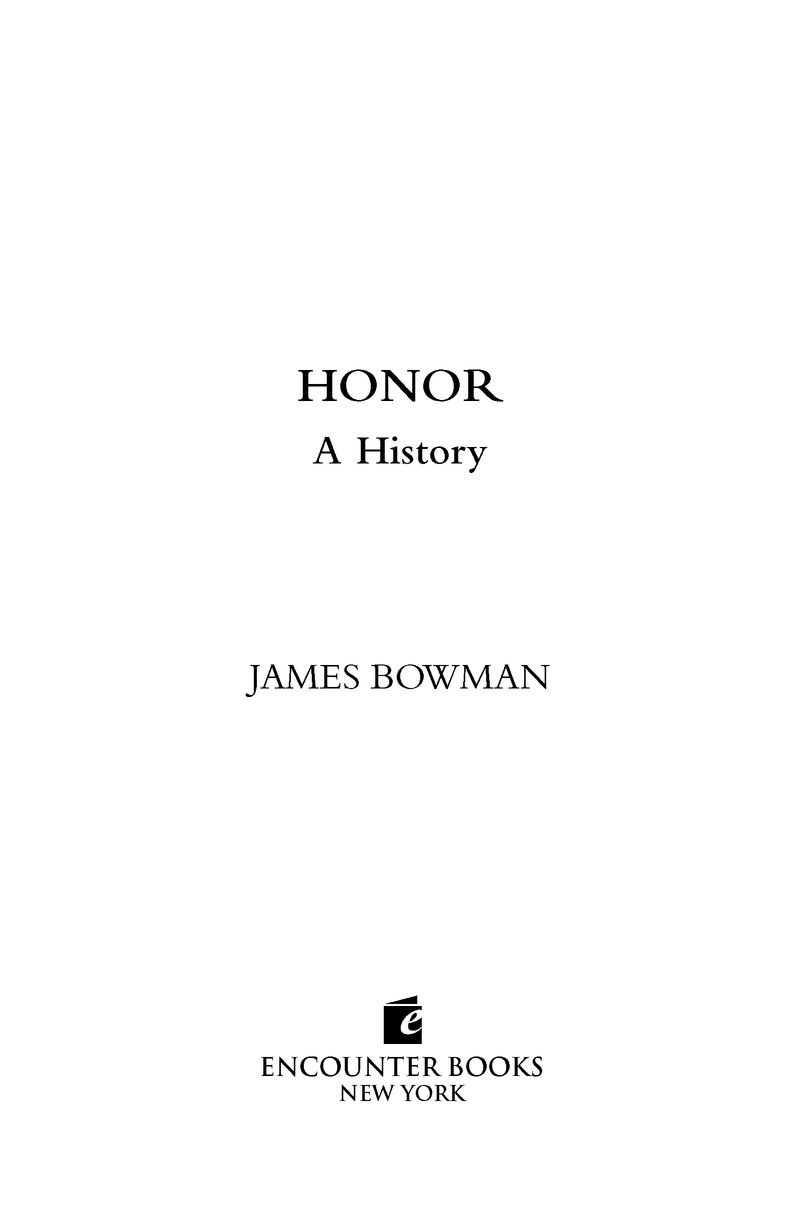Table of Contents
Praise for Honor
What an engaging book James Bowman has written, and what a daunting command he has of his material. Ranging across psychology, popular culture, military history, the arts, and politics, Honor is a tapestry of the 20th century that uses a neglected threadthe evolution of the complicated bundle of values that goes into the concept of honorto explain how our culture got where it is today. Honor gives that rarest of gifts: a new, powerful way of thinking about a familiar history.
Charles Murray, author of Losing Ground
James Bowman has written a profound and important book, at once fascinating and alarming, on the changing fortunes of the idea of honor in America and the West. Faced with the energy and the implacable hatred of the barbaric version of honor in radical Islam, our long-term survival may well depend on the reinvention of a form of honor suitable to free and democratic societies.
Robert Bork, author of The Tempting of America
You will gain a new insight on the first page of this book, and on the last, and there are fireworks all the way through, again and again. A real education, on a subtle topicon a topic of unheard-of, silent, horizon-shifting importance, like the shifting of the earth deep below the surface.
Michael Novak, author of On Two Wings
The book is written with such detail and persuasiveness that you feel that a vital, once missing element has suddenly been found.... By reacquainting us with the lost meaning and history of this once-powerful idea, Bowman helps us understand our present situation and gives us a language to reconnect with our own lost sense of honor.
Marty York, The Hill
Bowman has carried off a full-scale assault on some of the most cherished shibboleths of this disturbingly benighted age, reminding a bewildered generation of the great virtue of honor and, in the process, restoring hope.
Michael Bonafield, The Minneapolis Star-Tribune
James Bowmans Honor: A History offers a brilliantly astringent accounting for the disappearance of honor ... Bowman traces the idea of honor from its classical origins to its aristocratic and democratic forms.
Josiah Bunting III, Wall Street Journal
These terrorists consider themselves men of honor, and unfortunately they are ... theyre following an ancient social code, even if we cant recognize it anymore. The best guide to this code is James Bowmans book Honor: A History.
John Tierney, The New York Times
Bowman sees honor as few do today.
Mark Blitz, Claremont Review of Books
Chivalry. Modesty. Bravery. These values, common for much of history, gradually disappeared in the West during the 20th century. In a compelling and persuasive book, columnist and literary critic James Bowman explains the decline of the Wests honor culture and the consequences for the War on Terror ... Bowman traces the decline of the honor culture in the West from King Arthurs days to the present with scholarly detail, using witty examples from classical literature, movies and TV shows. Traditional values began to disappear after the World War I, when trench warfare was impersonal compared to individual combat. The decline reached its peak in the days of Vietnam, when make love, not war became the pacifist motto.
Diana Furchgott-Roth, The New York Post
A handful of books deserve notice not just for what they say, but for the very fact that they have been written at all. James Bowmans Honor: A History fits squarely into this category.... Although honor disdains justification by utility, Bowman is enough a rationalist to hint that we may need an idea of honor to survive and meet the extraordinary threats that we now face. For his courage in raising so unconventional a challenge, his country owes him the honor of its deepest gratitude.
James Ceaser, The Weekly Standard
To Vaughn V. Bowman Jr. and Vaughn C. Bowman for the honor of their service.
Introduction
The Two Kinds of Honor
ONE AFTERNOON IN WYOMING NOT LONG AGO, I was sitting outside under a sunny sky after a day of skiing. Some small children were playing nearby. They were having a good-natured snowball fight, which ended, as snowball fights often do, when the littlest child burst into tears. Soon his father came to rescue him. I couldnt hear the rest of what this man said but, as he passed me carrying the child, I heard him whisper: You cant expect, when you get somebody, that they wont get you back. It struck me as a neat summing-up of one of the earliest lessons we all learnso early that most of us have no memory of a time when we have not known itwhich is also the basis of what used to be called honor. We seldom call it that anymore for reasons that this book will attempt to explain, but for now its enough to remember that you cant expect, when you get somebody, that they wont get you back. People will stand up for themselves. When you hit them, theyll hit back. Its pretty much universal, yet its not really instinctive or biological. Its behavior that has to be learned, just as that child was learning it.
Anyone who has spent time with children knows the hopeless-ness of the counsel not to hit back. The sense of justice at its most basica blow for a blowis, if not biologically hardwired into us, at least so natural as to be as much a given of the human condition as if it were. Moreover, our sense of the public nature of its demands is equally universal. The youngest children know without having the concept explained to them what it means to lose face, to be contemptible in the eyes of their coevals, and will risk almost any displeasure or punishment from the adults in authority over them, rather than submit to such humiliation.This is honor at its most basic. And so deep-seated is the response that its almost impossible to imagine its replacement by some more benign principle of social interaction, either for individuals or for nations. In spite of the worthy efforts of our educators in conflict avoidance and peace studies, the ideal of a peaceful society built on such utopian models has proved to be as elusive as ever.
It would almost seem as if that most basic form of honor, that foundational social reflex to let others know one is not to be trifled with, is something that we must live with.Yet such a thought has become, over the last two or three generations, almost literally unthinkable. Ever since the war to end wars in 1914-1918, the utopian and pathological explanation of human conflictthat it has diagnosable causes in some personal, social or political illness and will end with the cure of that illness and thus the removal of those causes has been taken for granted not only by the most progressive thinkers but increasingly by ordinary people. Some people engaged in peace studies have even invented a word, bellicist, to describe those who still believe in this reflexive, hitting-back kind of honor as it applies to nations. War, in this view, is an aberration whose causes are always knowable and avoidable by sufficiently perspicacious statecraft. Of course there has never been a time when there have not been wars or preparations for war, but politicians of both left and right in America and elsewhere in the West have at least been forced to act as if they believed in the utopian viewwhich means that any wars they may choose to fight will have to be gone into more or less hypocritically.


